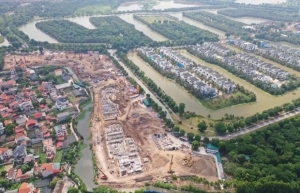INTERNATIONAL INVESTMENT
AND PORTAL
To ensure the 2024 Land Law be implemented smoothly, it is necessary to carefully review, analyse, and evaluate the contents of draft decrees detailing some articles on implementation and on land prices.
Regarding the transitional regulations related to land use rights, the draft decree does not ensure comprehensiveness and sufficient legal basis to resolve cases that arise in practice before the Land Law takes effect. The law and the draft decree detailing the implementation of some articles related to transitional provisions are lacking in adjusting cases that arise in practice.
 Nguyen Thi Nga, deputy head, Faculty of Economic Law, Hanoi Law University
Nguyen Thi Nga, deputy head, Faculty of Economic Law, Hanoi Law University
Specifically, regulations are omitted in the case of additional areas formed after sea reclamation. Previously, Clause 4 of Article 6 of Decree No.11/2021/ND-CP stipulated that organisations and individuals assigned sea areas for encroachment implementing projects can continue to use the land area formed after reclamation according to the legal provisions.
We believe that confirming legal land use rights formed after the project for the owner of the sea reclamation project is a reasonable regulation to protect the legitimate rights of sea encroachment investors, who have spent significant effort, capital, and other costs to prevent, combat, or overcome objective incidents such as coastal erosion.
The recognition of this land area for the investor also ensures that project implementation activities will be more convenient and effective for the same investor. This reasonable stance should be continued and regulated in the decree guiding the implementation of the Land Law to ensure a legal basis for practical implementation, while Decree No.42/2024/ND-CP on sea reclamation does not mention this issue.
Therefore, if both of these decrees are dismissed in this content, investors’ rights will not be guaranteed and the process of implementing sea reclamation projects will also face many obstacles. This addition also concretises the policy of encouraging sea reclamation and the policy of support and incentives for investors carrying out sea reclamation prescribed in Clause 2 of Article 9 of the current Land Law and Clause 1 of Article 190 of the new one.
Regarding transitional provisions related to compensation and resettlement when the state collects land, in Clause 4 of Article 254 of the new law, the price of compensation land and the price of land allocated for resettlement are different.
In cases that have a decision to collect land and a decision to approve the compensation, and resettlement plan before the effective date of the law, but a decision to allocate land for resettlement is made after the effective date of the law, the land price at the resettlement place is determined at the time of approval of the compensation and resettlement plan.
At the time of the decision to allocate resettlement land, if the price of resettlement land is lower than the land price in the compensation and resettlement plan, the land price at the time of issuance of the decision to allocate resettlement land will be applied.
This amendment aims to protect the rights of those who lost their land if there is a delay in compensation, or different prices of land allocation at the time of compensation decision and at the time of land allocation. People will enjoy the price that benefits them more, and not suffer damage that is caused by the delay in site clearance by authorities.
However, this regulation is not strict and does not completely resolve complaints arising in reality before the new law takes effect. Specifically, it omits cases in which the land allocation price for resettlement has been applied at a later time than the time of the decision on recovery, compensation, and resettlement plan. Thus, the person assigned land for resettlement has to pay any arising land use fees.
However, the law does not have transitional provisions for these cases. This will be problematic for courts to resolve disputes on land prices and usage fees. Therefore, we propose to supplement the decree guiding the implementation of the land law. The transitional provisions should be applied in cases of land recovery and allocation before it takes effect, in disputes on land prices, and calculating land use fees.
 New land law could entice Viet Kieu home
New land law could entice Viet Kieu home
The demand for property from overseas Vietnamese people is on the rise, helped along by revised land, housing and real estate laws.
 Revised Land Law expected to drive remittances to real estate market: Experts
Revised Land Law expected to drive remittances to real estate market: Experts
The Land Law (revised), which expands land use rights for overseas Vietnamese (OV) and Vietnamese citizens residing abroad, meets the aspirations of OVs and contributes to mobilising investment resources to Vietnam at the same time, said Nguyen Duc Hieu, standing member of the National Assembly (NA) Economic Committee.
 Rapid law implementation may propel market fortunes
Rapid law implementation may propel market fortunes
With quicker implementation of Vietnam’s new land law, the real estate market can resume normal operations and enter a more robust development cycle from the second half of this year.
By Nga Nguyen



















